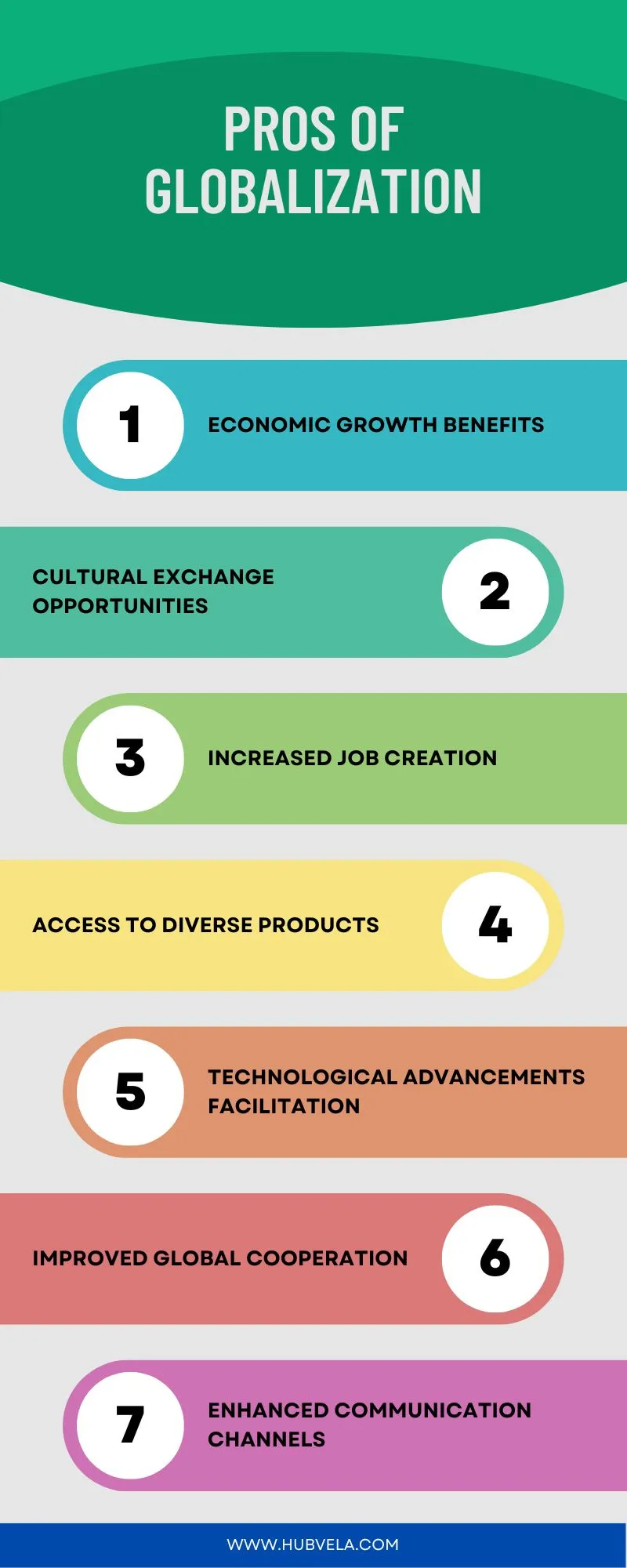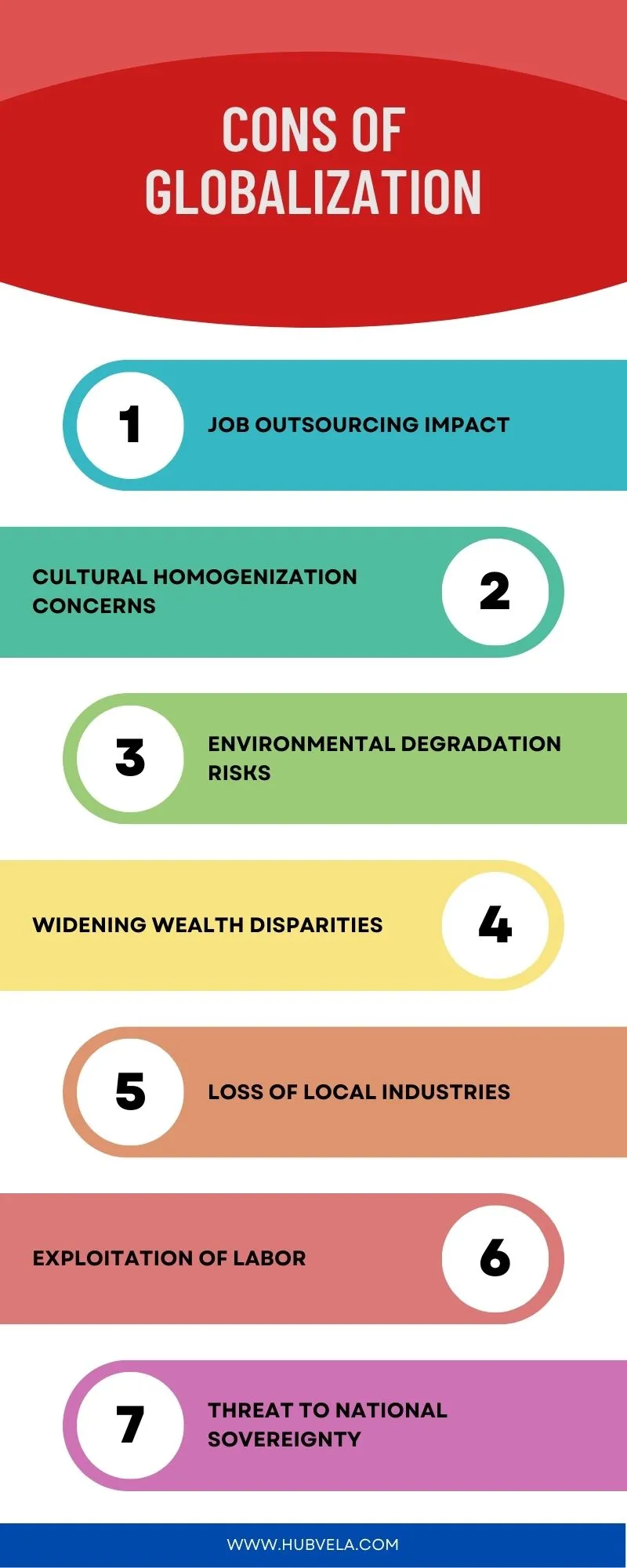Globalization has been a buzzword for several decades now, and it refers to the process of increased interconnectedness and interdependence among countries, businesses, and people worldwide.
The term globalization encompasses various aspects, including economic, political, cultural, and social integration. While globalization has brought about numerous benefits, such as increased trade, improved communication, and cultural exchange, it has also faced criticism for its negative impacts, such as job loss, environmental degradation, and cultural homogenization.
In this article, we will explore the pros and cons of globalization, to help you gain a better understanding of this complex phenomenon.

--Advertisement--
Pros of Globalization
Globalization, a phenomenon that has reshaped our world over the past several decades, continues to spark lively debates about its impact on societies, economies, and cultures.
We will explore numerous benefits that globalization brings, highlighting how it fosters cultural exchange opportunities, promotes economic growth, and improves global cooperation.

1. Economic Growth Benefits
Embracing globalization can lead to significant economic growth benefits, providing opportunities for increased trade and investment across borders. By expanding markets beyond domestic boundaries, businesses can access a larger customer base, leading to higher sales and profits. This increased trade can also result in the creation of new jobs and industries, stimulating economic growth.
Globalization allows for the flow of capital across borders, enabling companies to invest in new markets and technologies. Access to a wider range of products and services from around the world can lead to greater efficiency and innovation in various sectors.
2. Cultural Exchange Opportunities
Experience diverse cultures firsthand through the cultural exchange opportunities facilitated by globalization.
By opening up borders and creating interconnectedness, globalization allows for the sharing of traditions, languages, arts, and customs between people from different parts of the world.
This can lead to a greater appreciation and understanding of various cultural backgrounds, fostering tolerance and respect.
Through travel, international events, and digital communication, individuals have the chance to immerse themselves in new ways of life, broadening their perspectives and breaking down stereotypes.
These cultural exchanges not only enrich personal experiences but also contribute to a more interconnected and harmonious global community.
Embrace the opportunity to learn from others and celebrate the diversity that globalization brings.
3. Increased Job Creation
By fostering global connections and promoting cross-border collaborations, globalization significantly contributes to the creation of job opportunities worldwide. Companies expanding internationally require a diverse workforce, leading to more employment opportunities in various sectors.
As businesses grow and establish operations in different countries, they often hire local talent, stimulating job creation within those regions. Globalization also fuels the demand for specialized roles such as language translators, international marketing experts, and supply chain managers.
The outsourcing of certain tasks to countries with lower labor costs can create new jobs in those economies. Overall, the interconnected nature of the global economy under globalization has been instrumental in generating employment opportunities on a global scale, benefiting individuals and economies alike.
4. Access to Diverse Products
Diverse products from around the world are easily accessible due to the benefits of globalization. Thanks to the interconnectedness of global markets, you now have the opportunity to enjoy a wide range of goods and services that were once unavailable in your local area.
Whether it’s trying out unique foods, purchasing traditional crafts, or accessing the latest technological gadgets, globalization has made it possible for you to explore and experience products from different cultures and regions. This access not only broadens your choices but also promotes cultural exchange and understanding.
Embracing diverse products can enrich your life, introducing you to new tastes, styles, and innovations that you may not have encountered otherwise.
5. Technological Advancements Facilitation
With globalization, technological advancements are facilitated, enhancing connectivity and efficiency across borders. The ease of sharing information and ideas globally has revolutionized communication. Through platforms like video conferencing and instant messaging, businesses can collaborate seamlessly across continents, leading to increased productivity and innovation.
Advancements in transportation technology have made it quicker and more cost-effective to transport goods worldwide. This hasn’t only expanded market opportunities for businesses but has also allowed consumers access to a wider range of products from different parts of the world.
Technological advancements in automation and artificial intelligence have streamlined processes, making production more efficient and cost-effective. Overall, the facilitation of technological advancements through globalization has led to significant benefits for businesses and consumers alike.
6. Improved Global Cooperation
Facilitating improved global cooperation, globalization fosters enhanced collaboration among nations, leading to various benefits for economies and societies worldwide. By promoting trade agreements, international organizations, and diplomatic relations, globalization helps countries work together to address global challenges such as poverty, climate change, and health crises.
Enhanced global cooperation also encourages the sharing of knowledge, resources, and technologies, allowing for more efficient problem-solving and innovation on a global scale. Through partnerships and alliances formed across borders, countries can combine their strengths and expertise to achieve common goals, resulting in mutual growth and development.
Ultimately, improved global cooperation facilitated by globalization paves the way for a more interconnected and prosperous world for all nations involved.
7. Enhanced Communication Channels
Utilizing advanced technology and interconnected networks, globalization enhances communication channels, revolutionizing the way individuals and businesses interact on a global scale.
Through the internet, social media, and instant messaging, people can now communicate effortlessly across borders in real time. This increased connectivity has paved the way for collaborations, partnerships, and knowledge-sharing opportunities that were previously unimaginable.
Businesses can now conduct meetings virtually, negotiate deals internationally, and reach a broader audience with ease. Individuals can connect with friends and family worldwide, fostering cultural exchange and understanding.
Enhanced communication channels have also facilitated rapid responses during crises, enabled remote work possibilities, and promoted global awareness of important issues. Embracing these advancements can lead to a more interconnected and informed global community.
Cons of Globalization
While globalization has brought about several benefits, it also has its downsides. We will explore the cons of globalization and how it affects different aspects of our lives.
From threats to national sovereignty to environmental degradation, we will delve into the cons of globalization. So, let’s take a closer look at the dark side of globalization and what we can do to mitigate its negative effects.

1. Job Outsourcing Impact
Outsourcing jobs to other countries has significantly impacted local employment opportunities, leading to concerns about job security and economic stability. Companies often choose to outsource jobs to countries with lower labor costs, which can result in layoffs and reduced job prospects in your community.
This practice not only affects individual workers but can also weaken the overall economy by decreasing consumer spending power and tax revenues. Job outsourcing can lead to a skills gap in certain industries as jobs are moved overseas, potentially hindering future growth and innovation locally.
As a result, the trend of outsourcing jobs is a major downside of globalization that continues to raise worries about the long-term sustainability of employment and economic development in your area.
2. Cultural Homogenization Concerns
Globalization poses a significant concern for many as it leads to cultural homogenization, potentially erasing unique traditions and identities. As different cultures interact more closely, there’s a risk of losing diversity and distinctiveness.
With the spread of Western values and consumerism, local traditions and languages may be overshadowed, impacting the cultural heritage of various societies. The dominance of global media and entertainment can further perpetuate a standardized culture, diluting the richness of individual customs.
This trend not only diminishes the authenticity of traditions but also contributes to a sense of cultural loss and disconnection among communities. Preserving cultural diversity in the face of globalization remains a pressing challenge to maintain the world’s cultural richness.
3. Environmental Degradation Risks
The increase in worldwide trade and production has led to heightened risks of environmental degradation. As companies expand globally to cut costs and increase profits, they often overlook environmental concerns. This can result in deforestation, pollution, habitat destruction, and the depletion of natural resources. Globalization encourages industries to prioritize economic growth over sustainable practices, leading to negative impacts on the environment.
The transportation of goods across long distances also contributes to greenhouse gas emissions and air pollution. Weaker environmental regulations in some countries where production is outsourced can further exacerbate these issues. It’s crucial for companies and governments to prioritize environmental protection measures to mitigate the detrimental effects of globalization on the planet.
4. Widening Wealth Disparities
Amidst the push for global economic integration, wealth disparities are widening at an alarming rate. While globalization has led to economic growth in many regions, it has also exacerbated income inequality.
Multinational corporations often exploit cheap labor in developing countries, leading to significant wage gaps between workers in different parts of the world. The concentration of wealth in the hands of a few powerful entities has left many individuals and small businesses struggling to compete in the global market.
As a result, the rich are getting richer, while the poor are finding it increasingly challenging to break the cycle of poverty. Addressing these widening wealth disparities is crucial to ensuring a more equitable and sustainable global economy.
5. Loss of Local Industries
As wealth disparities widen due to global economic integration, local industries are facing a significant threat of loss. Small businesses that once thrived in your community are struggling to compete with larger corporations that can produce goods at lower costs overseas.
This shift towards outsourcing and offshoring has led to the closure of many local factories and workshops, resulting in job losses and economic instability in your area. The unique craftsmanship and expertise that were once the pride of your town are gradually disappearing as cheaper mass-produced items flood the market.
While globalization has brought access to a wider range of products, it has come at the expense of local businesses and the cultural heritage they represent.
6. Exploitation of Labor
With global economic integration, labor exploitation has become a pressing issue, affecting workers worldwide. Companies often seek cheaper labor in developing countries, where they can pay lower wages and offer fewer protections to workers. This can lead to poor working conditions, long hours, and inadequate pay for employees who may have limited alternative job options.
Some corporations take advantage of lax labor laws in certain regions to maximize profits at the expense of fair treatment for their workers. Exploitative practices such as child labor, forced labor, and unsafe working environments are unfortunately common in industries where globalization has created a race to the bottom in terms of labor standards.
It’s crucial to address these issues and ensure that workers are treated ethically and fairly in a globalized economy.
7. Threat to National Sovereignty
Globalization poses a significant threat to national sovereignty as countries find themselves increasingly interconnected economically and politically, raising concerns about the erosion of independent decision-making power.
The rise of global trade agreements and multinational corporations can limit a country’s ability to enact policies that may contradict international agreements or offend powerful global players. Organizations like the World Trade Organization and the International Monetary Fund can impose conditions on countries seeking financial assistance, further undermining their sovereignty.
As nations become more intertwined through globalization, their autonomy to govern as they see fit becomes compromised, potentially leading to conflicts between national interests and global pressures. It’s crucial for countries to navigate these complexities carefully to protect their sovereignty in a globalized world.
Conclusion on Pros and Cons of Globalization
In conclusion, globalization has its benefits such as increased economic growth and cultural exchange.
However, it also comes with drawbacks like widening income inequality and loss of cultural identity.
It’s important to weigh these pros and cons carefully to ensure that globalization is implemented in a way that maximizes the benefits for all while minimizing the negative consequences.


